How to do keyword research for SEO
Keywords are the foundation of SEO. If no one is searching for the content you're writing about, you won't get any traffic from Google - no matter how hard you try.
That's why mastering the art of keyword research is so important to achieving SEO success. The cost of making mistakes is too high. Choose the wrong keywords and you risk wasting a lot of your time and resources.
There are quite a few important notes and misconceptions that you need to keep in mind to make better SEO decisions. Let's find out details through the following article!
Part 1: Basic keyword research
If you're new to SEO, you're probably wondering what keyword research is and why it's so important.
What is keyword research?
Keyword research is the process of discovering valuable search queries that your target customers enter into search engines like Google to search for products, services, and information.
Why is keyword research important?
If you publish a page about a topic that no one is searching for, that article won't get any traffic from Google (or other search engines).
According to research, many website owners make that mistake, and it's part of the reason why 90.63% of sites on the Internet don't get traffic from Google.
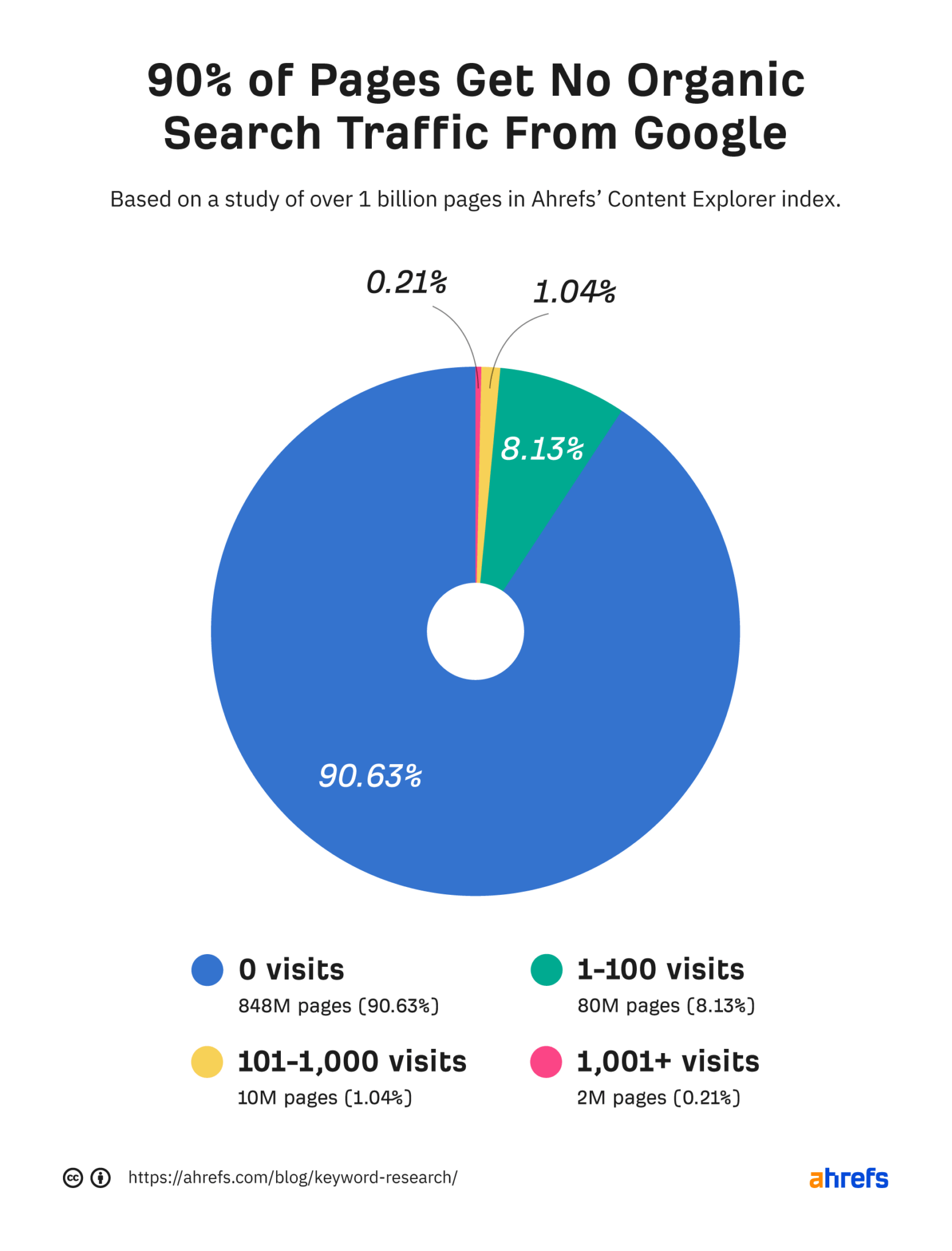
Keyword research helps you ensure that there is search demand for whatever you want to write about. Therefore, if your page ranks well on Google for your target keyword, you will get a stream of highly targeted visitors to that page consistently.
Part 2: How to find keyword ideas
Keyword research starts with putting yourself in your customer's shoes. What words and phrases can they use to find solutions to their problems? Plug them into a keyword research tool like Ahrefs' Keywords Explorer and you'll find thousands of more relevant keyword ideas beyond what you just came up with.
It's a simple process but you need two things to do it well:
- Good knowledge of your industry
- Understanding how keyword research tools work
That is the content of this section.
1. Brainstorm to find the keyword 'seed'
Seed keywords are the starting point of the keyword research process. They define your niche and help you identify your competitors. Every keyword research tool requires a seed keyword, which it then uses to generate a huge list of keyword ideas.
If you already have a product or business you want to advertise online, generating seed keywords is easy. Just think about what people type into Google to find what you offer.
For example, if you sell coffee and coffee equipment, your main keyword might be:
- coffee
- cappuccino
- french press
- nespresso
- Etc.
Note that seed keywords themselves are not necessarily worth targeting to pages on your website. As the name suggests, you will use them as 'seeds' for the next steps in this process. So don't obsess too much about your seed keywords. It only takes a few minutes to correctly identify them. As soon as you have some broad ideas regarding your website topic, move on to the next step.
2. See what keywords your competitors rank for
Looking at what keywords helped your competitors gain traffic is often the best way to speed up the keyword research process. But first, you need to identify those competitors. That's where your well-thought-out keyword list comes in handy. Just Google one of the main keywords and see who ranks on the first page.
If there aren't any sites ranking top for the same main keyword as yours (or where you're trying to take it), then you should try searching for something a little more specific.
For example, if you sell coffee equipment on your site, you might find more actual competitors in the search results for 'cappuccino maker' instead of 'coffee maker'. '. That's because most ecommerce stores rank according to previous rankings and blog rankings the same as yours.
Once you find a competitor site that fits your requirements, you should connect it to a competitive intelligence tool like Ahrefs' Site Explorer to check which site is bringing in the most traffic. and what keywords these pages are targeting.
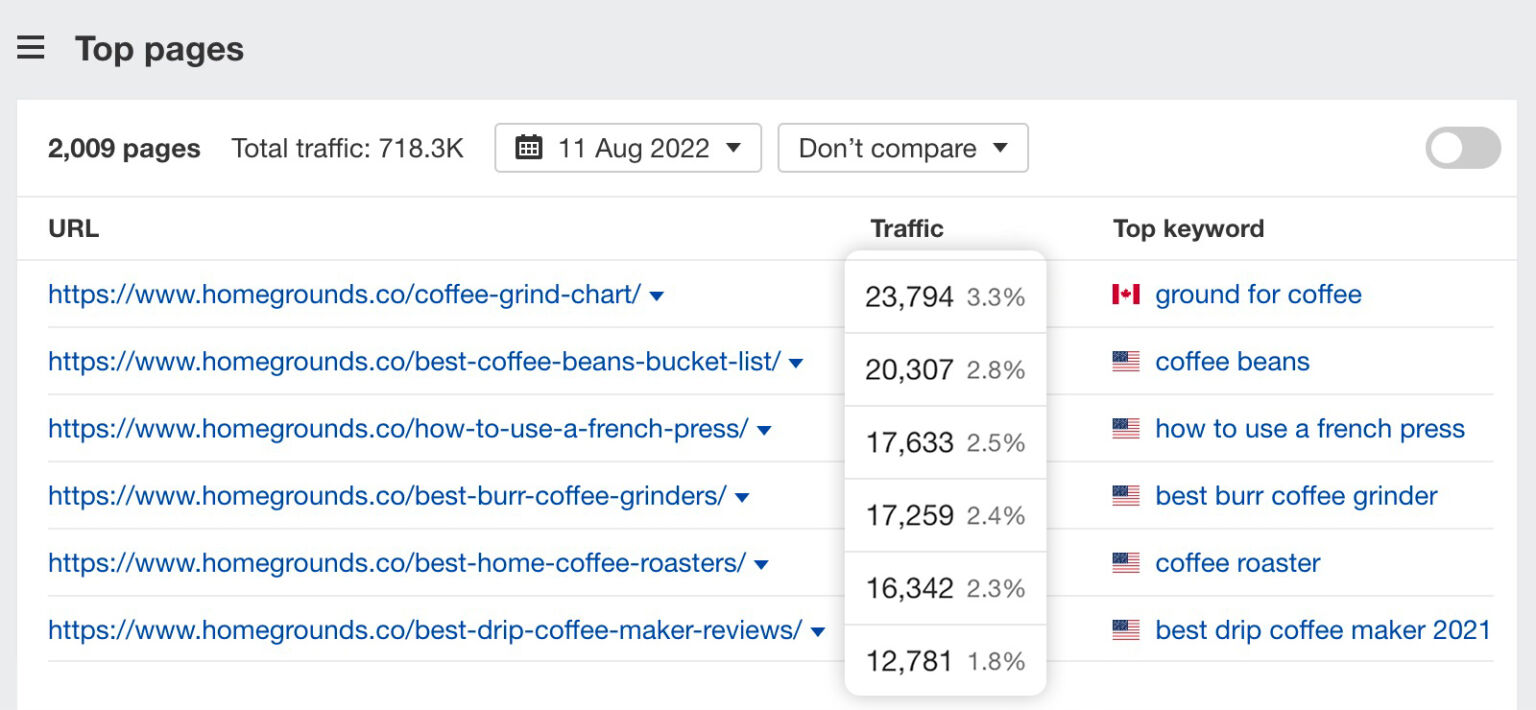
After repeating this process with a few competitors, you will find yourself with a sizable list of relevant keywords. And you haven't even started your keyword research yet!
Whether these keyword ideas are purely informational (i.e. blog posts) or have a commercial intent (i.e. product pages), we will determine in later stages of the process. your keyword research process. For now, your goal is to collect as many relevant keyword ideas as possible.
Make sure to repeat this process for as many competitors as possible.
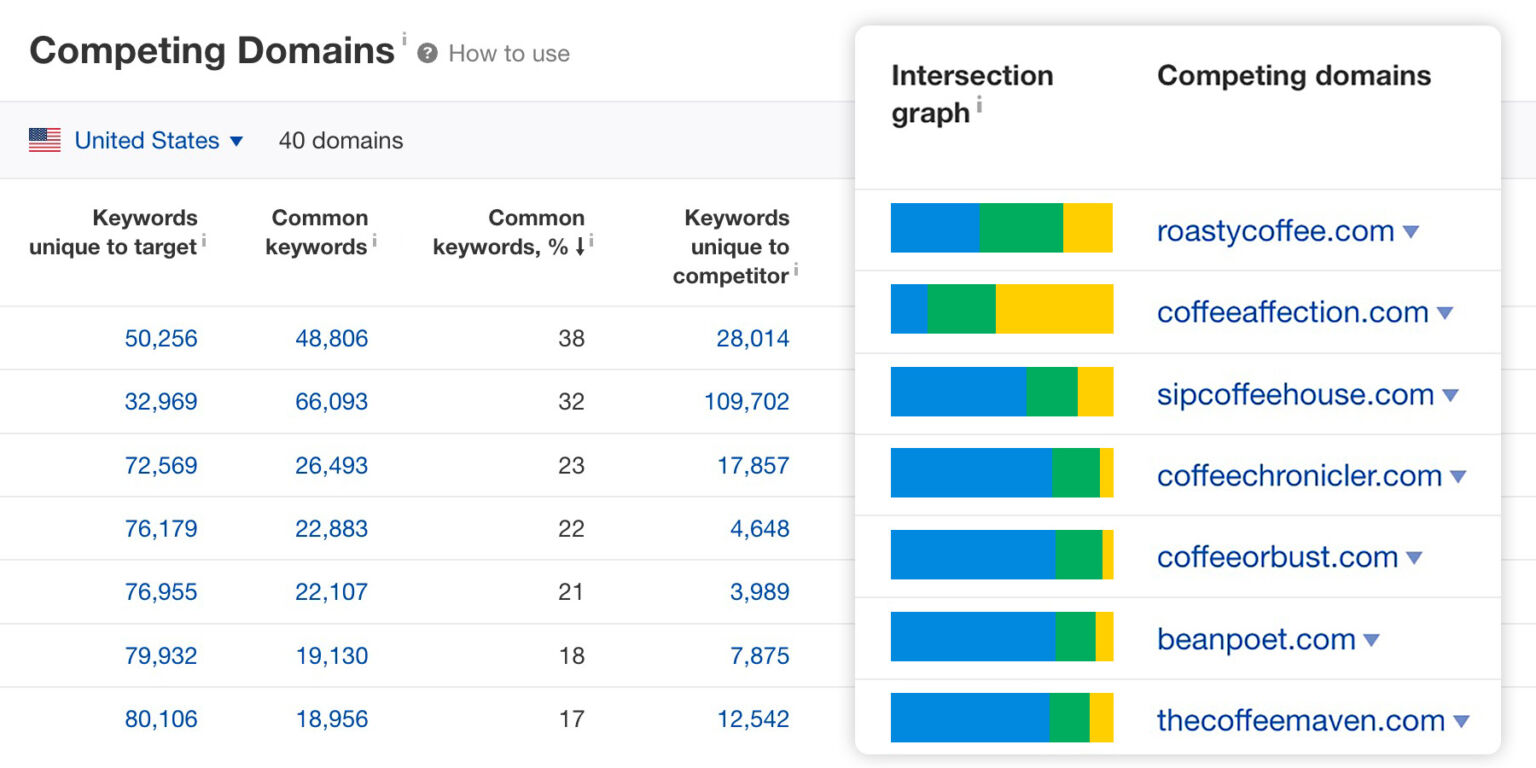
3. Use keyword research tools
Competitors can be a great source of keyword ideas. But chances are there are many keywords your competitors haven't mentioned. You can find them using various keyword research tools.
Keyword research tools all work the same way. You enter a seed keyword and they pull keyword ideas from the database based on that keyword.
Google Keyword Planner (abbreviated as GKP) is probably the most famous keyword tool. It's free to use, and although it's made for people who want to show paid ads on Google, you can also use it to find keywords for SEO purposes.
Here are some keyword ideas that GKP provided for the seed keyword 'coffee':
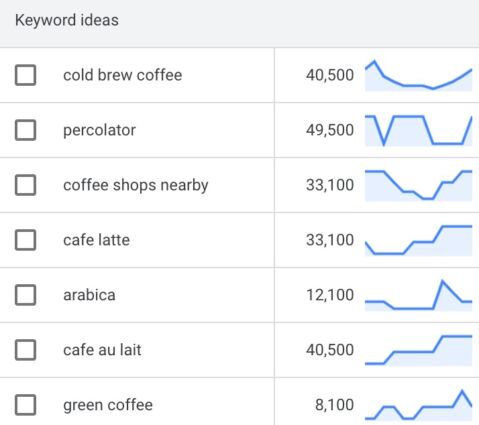
It's important to note that GKP has the ability to generate keyword ideas that don't necessarily have your original keyword in them. Take the keyword 'percolator' as an example. Unless you're a coffee connoisseur, you probably wouldn't know this has anything to do with coffee. This makes GKP a useful tool for discovering obscure keyword ideas.
And whenever you discover such an interesting keyword, try using it as a new seed keyword and see what kind of new keyword ideas you will get from it.
In addition to Google Keyword Planner, there are many other free keyword research tools. These are great if you're just starting out, but you'll soon realize that they're quite limited in data and functionality.
Therefore, if you are serious about increasing search traffic to your website, you might as well skip the free tier and use a 'professional' keyword research tool. Like Ahrefs Keywords Explorer.
Let's enter some seed keywords and see how many keyword ideas it gives us.
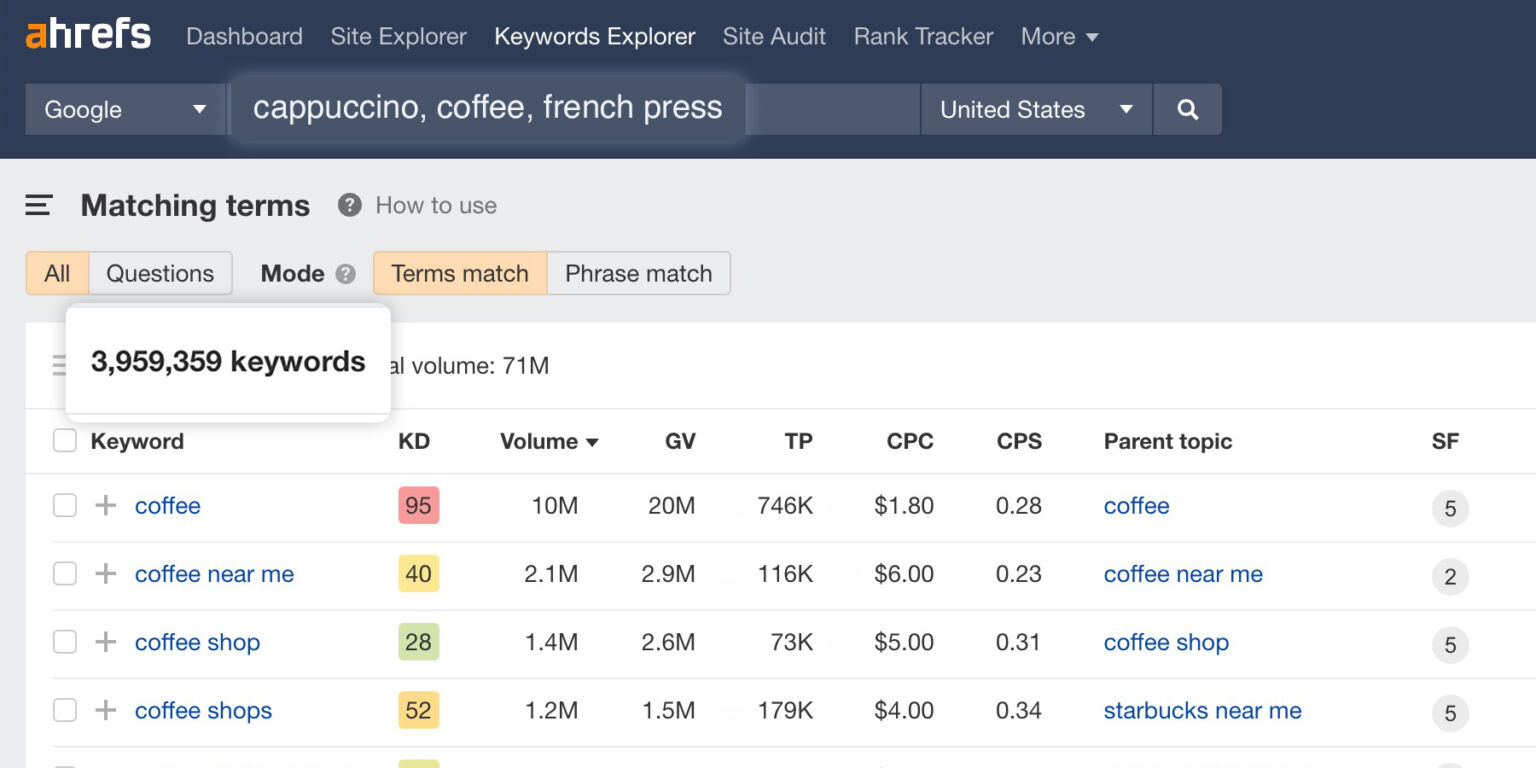
3.9 million keywords! No other free tool allows you to work with such a large number of keyword ideas.
This is a large number of keywords to work with. But don't worry! You'll learn how to narrow them down right in the tool later in this guide.
4. Research your niche
Everything we've discussed so far is enough to generate an almost unlimited number of keyword ideas. But at the same time, this type of process also keeps you 'in the box'.
You can solve this problem by going to places your target audience hangs out - forums, industry groups, and Q&A sites - and studying their conversations.
For example, here's a thread found on the /r/coffee subreddit:

A quick check in keywords explorer and this search query was found: 'aeropress coffee to water ratio'. It only gets 150 searches per month, but the fact that this topic received 42 upvotes on Reddit means people really appreciate this knowledge. Additionally, the content of that Reddit thread can serve as a foundation for your future content.
In addition to browsing industry forums, your current customers can also be a great source of keyword ideas. So the next time you talk to them, remember to pay attention to the language they use and the common questions they ask. That might lead you to some initial keyword ideas to include on the site.
Part 3: How to analyze keywords
Having access to millions of keyword ideas is a good thing. But how do you know which one is best? After all, reviewing them all manually would be a nearly impossible task.
The solution is simple: Use SEO metrics to narrow things down and "separate the rice from the chaff" before adding them to your keyword list.
Let's explore four keyword metrics you can use to do this.
Search volume
Search volume tells you the average number of times a keyword is searched each month. For example, 'donald trump' has a monthly search volume of 3.1 million in the US alone.
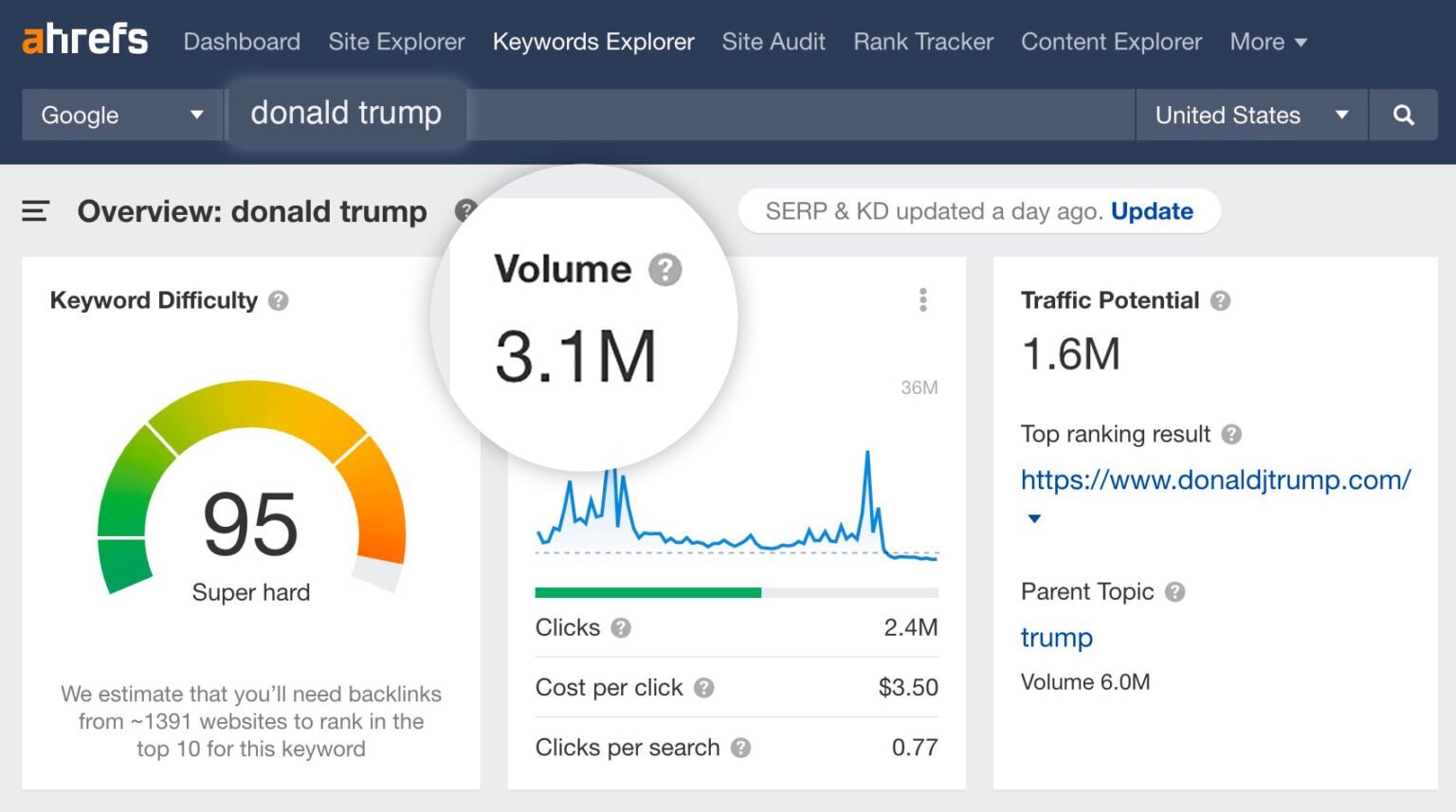
There are four important things to know about search volume metrics:
- It's the number of searches, not the number of people who searched – There are cases where someone may search for a keyword multiple times in a month (e.g. 'weather in singapore'). All such occurrences contribute to that keyword's search volume, even though it's the same person doing the search.
- It doesn't equal the number of visits you get based on ranking - Even if you rank #1, your traffic from that one keyword will rarely exceed 30% of search volume. And that's if you're lucky.
- That's the yearly average – If there were 120k searches for a keyword in December and no searches in the remaining 11 months of the year, the reported monthly search volume for that keyword would be is 10 thousand (120 thousand/12 months).
- It is country-specific – Keyword tools typically show search volume for the selected country. But some of them also have the option to show you global search volume, which is the total search volume across all countries.
Almost every keyword research tool will have a search volume filter to allow you to focus on keyword ideas with a specific level of popularity. It has two main use cases:
- Filter out keywords with super high search volume – If your website is new, then you probably don't want to waste time looking at keywords that have over 10k monthly searches as they may be too competitive for your competitors. with you.
- Filter specifically for lower search volume keywords – Perhaps you want to look for low search volume, non-competitive keywords where you can easily get a little traffic. These are often called 'long-tail keywords'.
Long-tail keywords are a familiar name in SEO. However, they are often overlooked. It seems like no one wants to pursue a keyword unless it gets at least a hundred searches per month. Leave it alone if it appears with zero search volume.

Such 'no search volume' keywords will only bring in a few visitors per month if you manage to rank for them. But what if it adds up? If you publish a hundred articles targeting such keywords, your total annual traffic could actually amount to several thousand highly targeted visitors.
It is a common beginner mistake to ignore keywords with low search volume. They are just as useful as more popular keywords. Even more useful because they are specific and often have high commercial value.
Another important thing to remember about search volumes is that they can vary slightly depending on the engine. That's because each tool calculates and updates this metric in different ways.
In general, search volume is an extremely important metric in SEO.
Potential traffic
The search volume in the US for the following two keywords is almost equal:

That means the amount of search traffic you can get from targeting each of them should be roughly the same, right?
Not necessarily.
Let's take the top ranking pages for each of these keywords and compare the amount of search traffic they receive in the US. This can be easily done by copying their URL into Ahrefs Site Explorer.
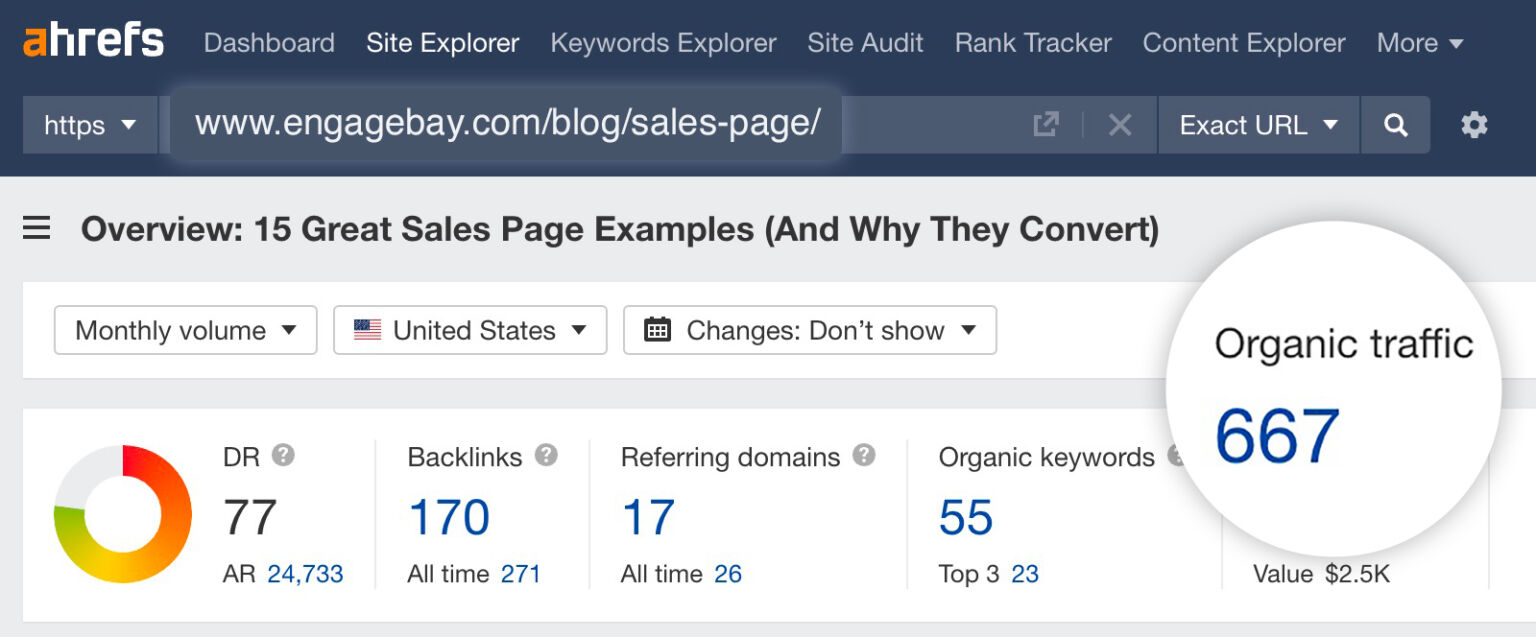
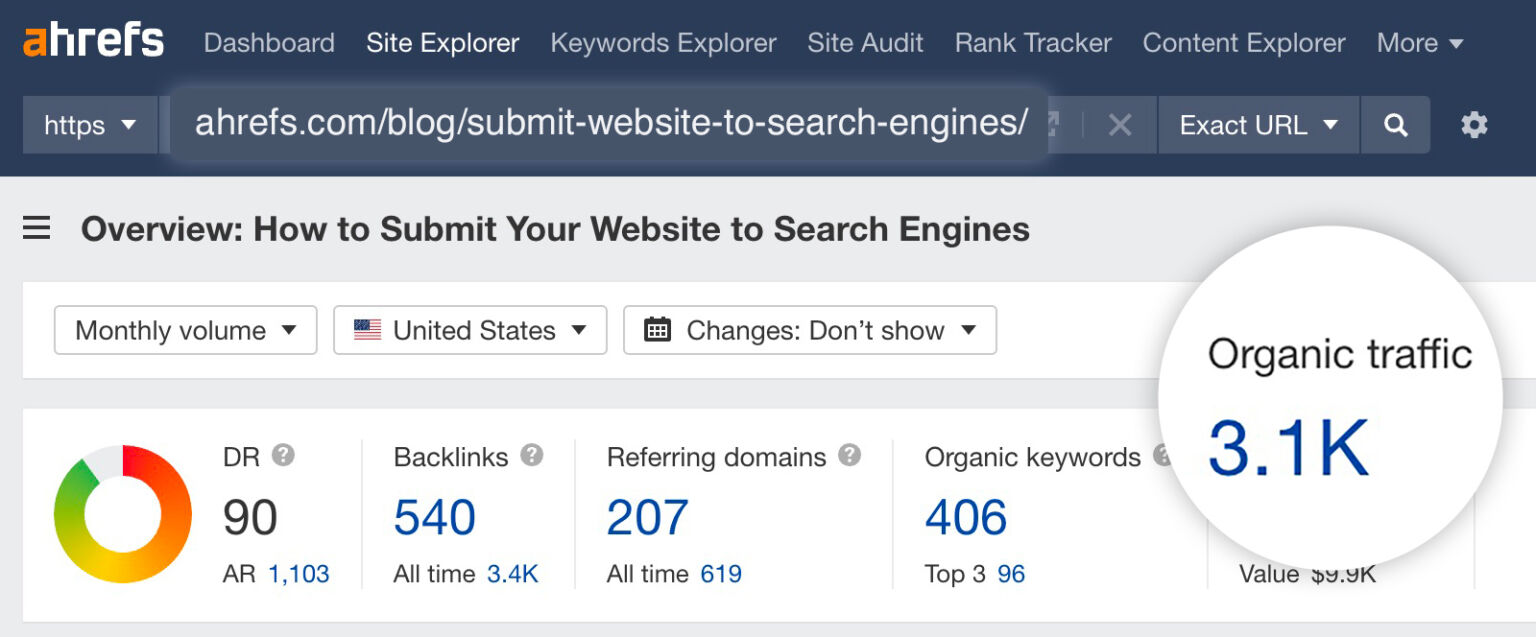
And it turns out that one of these pages is actually getting almost five times more search traffic than the other.
Why is that?
Websites don't rank in Google for just one keyword. If you look closely at the two screenshots above, you will see that the top ranking page for 'sales page' is ranking on Google for 55 keywords (check the 'Organic keywords' box). While the top ranking page for 'submit website to search engines' ranks on Google for a total of 406 different keywords.
Here are a few of them (as seen in the Organic keywords report in Site Explorer):
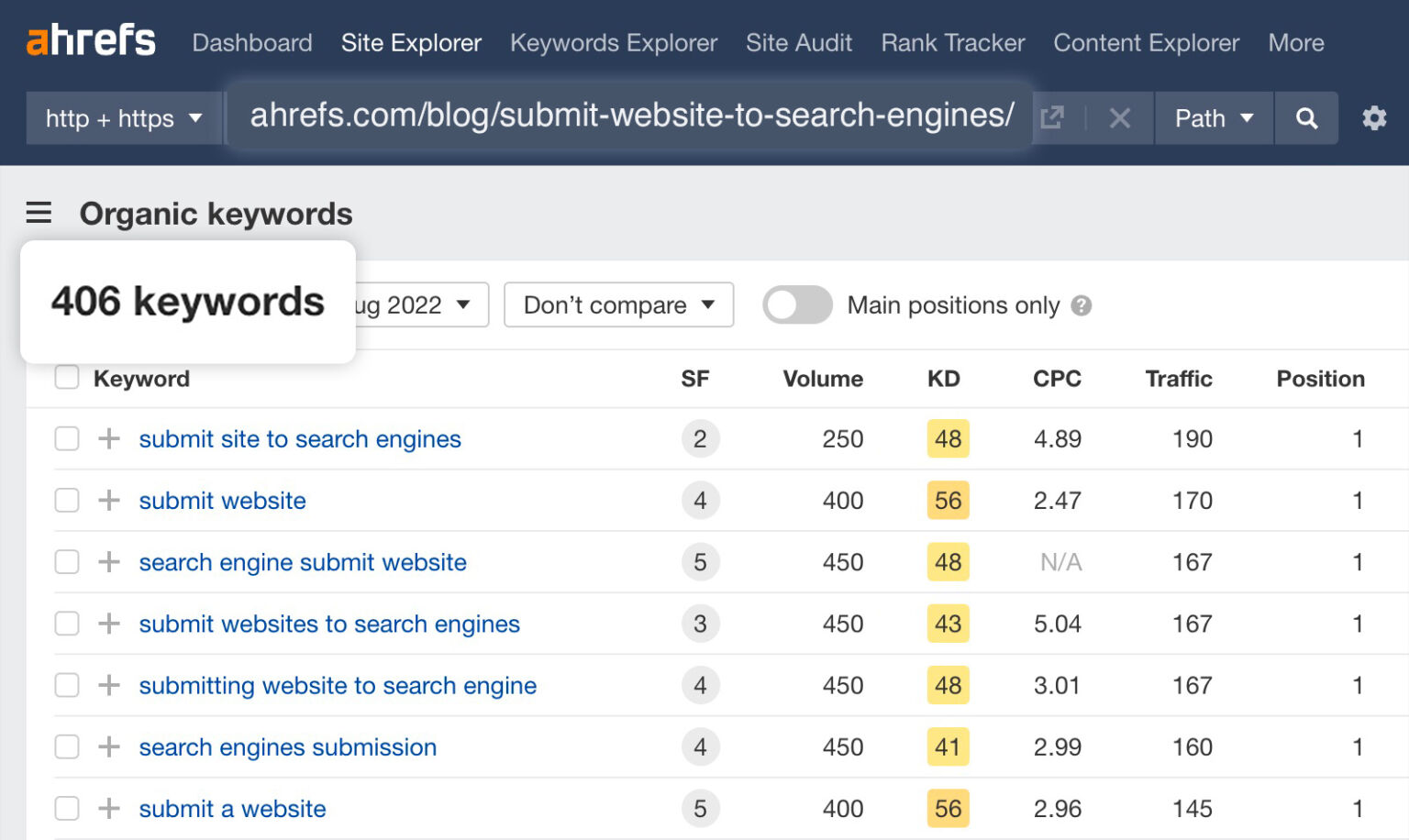
No matter what search query you have in mind, each person will express it differently when they are essentially looking for the same thing. Google is smart enough to understand that. And so it ranks the same page for all these similar search queries.
The average ranking page will also rank for about a thousand similar keywords. This means you shouldn't blindly rely on a keyword's search volume when estimating the search traffic your page will receive if it ranks. Instead, what you need to do is check the top ranking pages for that keyword and see the total search traffic they get from all the variations of that keyword they rank for. .
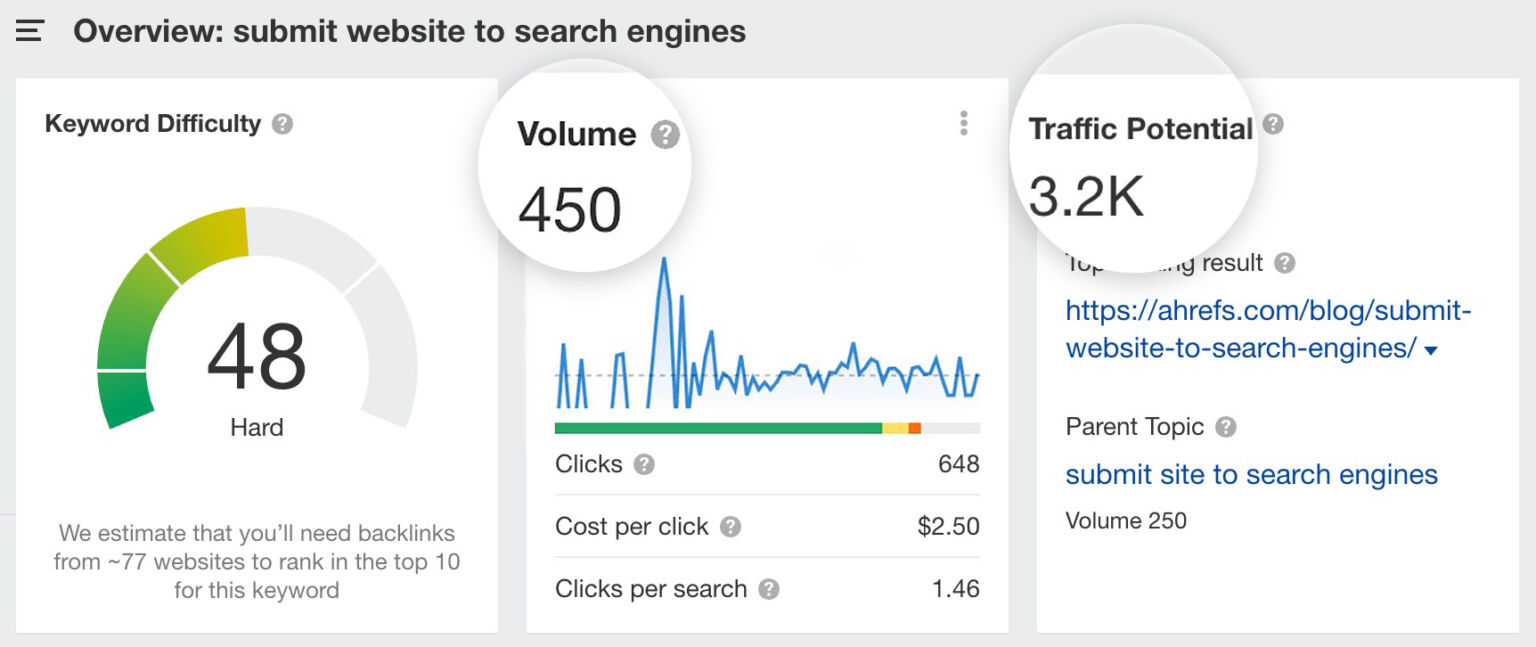
Keyword difficulty
Experienced SEO experts often evaluate the ranking difficulty of each keyword manually. That is, by looking at the search results for each keyword and analyzing them. They take into account many different factors to assess how difficult or easy it is to rank:
- Search intent
- Content depth, relevance, freshness, credibility
- Quantity (and quality) of backlinks
- Domain ranking
- SERP feature
- Etc.
This process varies from person to person and there is no exact consensus on what is and is not important here.
One person may believe that domain ranking is important and another may think that relevance plays a more important role.
Opinions can also vary depending on the type of search query they are analyzing, as for different types of queries Google will prioritize different things.
All of that makes it a bit difficult for SEO tool creators who try to distill the complex concept of ranking difficulty down to a simple two-digit number.
But after talking to many professional SEO experts about the signals that an actionable Keyword Difficulty (KD) score should have, it turns out that everyone agrees on at least one thing: Backlinks are important. to rate.
So the final decision was to calculate a Keyword Difficulty (KD) score based on the number of unique websites linking to the top 10 ranking pages.
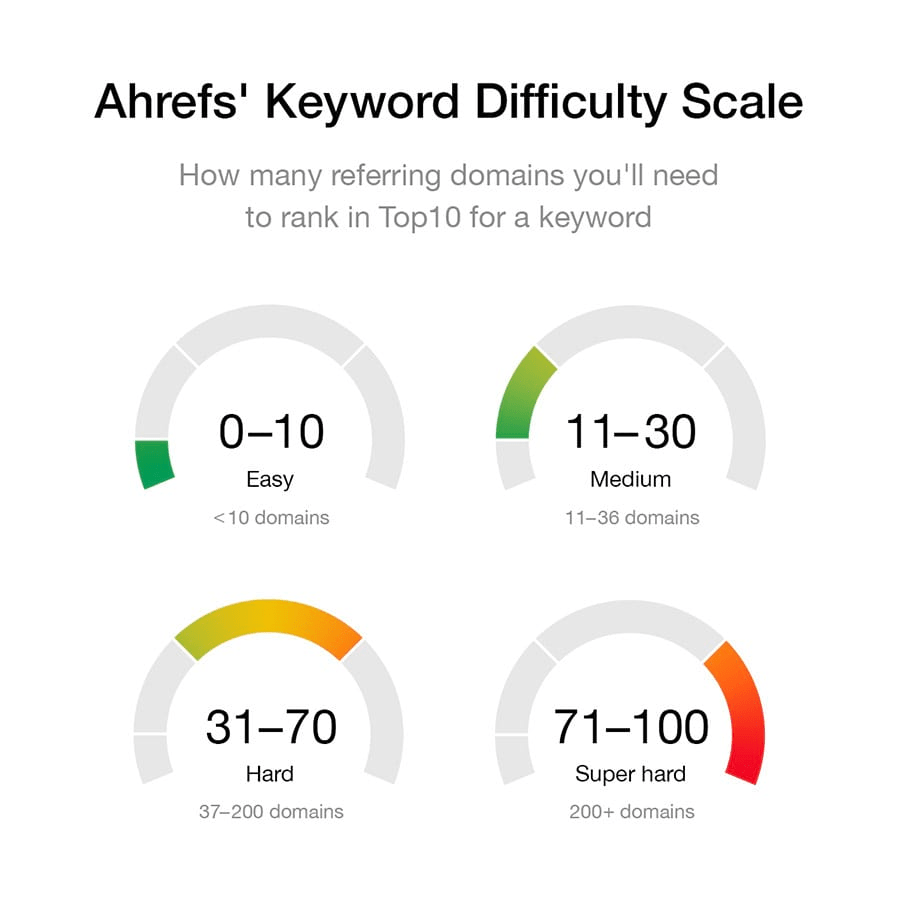
As you can see in the image above, KD refers to the estimated number of linking sites your site needs to rank in the top 10.
Note this is not the estimated number of linking sites you need to rank number 1. It is the estimated number you need to rank in the top 10. Getting to number 1 is an absolute battle completely different.
Many people misuse KD metrics by setting the filter from 0 to 10 and focusing only on easy keyword ideas. But here's why avoiding high KD keywords can be a mistake:
- You should go after high KD keywords as soon as possible – You will need a lot of backlinks to rank for high KD keywords, which takes a lot of time and resources. So, you should create your page and start promoting it as soon as possible. The sooner you start, the faster you will succeed.
- View high-KD keywords as link opportunities – The fact that the top ranking pages for certain keywords have many backlinks is a sign of a 'link-worthy' topic. If you create something unique on that topic, chances are more people will link to you.
The bottom line is: KD is not there to prevent you from targeting specific keywords. It's there to help you understand what it takes to rank for a given query (as well as 'link worthiness' for a given topic).
Just know that you should always evaluate keywords manually before pursuing them and not rely solely on any tool's difficulty score to make your final decision. No single score can distill the complexity of Google's ranking algorithm into a single number. Be wary of tool creators who suggest otherwise.
Cost per click (CPC)
Cost per click (CPC) indicates the amount an advertiser is willing to pay for a click on an ad displayed at the top of search results for a given keyword. This is more a metric for advertisers than SEO, but it can serve as a useful measure of a keyword's value.

For example, the keyword 'project management software' has a fairly high CPC of $30. That's because the people searching for it seem to be looking for a product to buy.

But it's a different story with 'project management methodologies'. This is clearly an informational query, and the odds of selling your project management software to these people are not high - hence the much lower CPC of $6.
One important thing to know about CPC is that it is much more volatile than search volume. While search demand for most keywords stays roughly the same from month to month, their CPCs can change at any time as more companies show ads for them.
This means that the CPC values you see in various SEO tools are only chronological and not particularly accurate. If you want to get real-time CPC data, you should use AdWords.
Part 4: How to target keywords
A very important step in keyword analysis is determining the type of page you will need to create to maximize your chances of ranking. And whether you can use that page to target a group of related keywords at once. Or maybe create a few additional pages to target some individual keywords.
Let's explore how you determine those things.
1. Identify the main topic
Let's say you have the following keywords in your list:
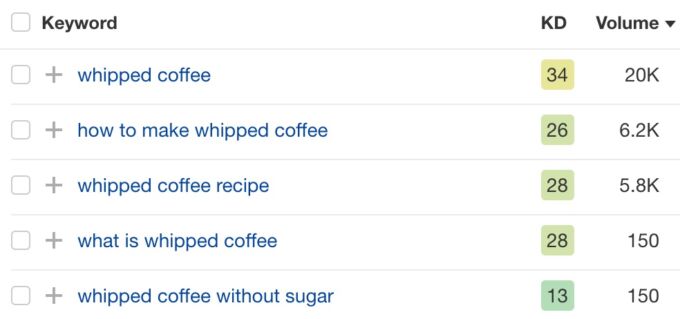
All of these search queries seem to be talking about the same topic: 'whipped coffee'. But does that mean a page can rank well for all of these keywords? Or perhaps you will need to create individual pages to target each one individually?
The answer largely depends on how Google views these keywords. Does it consider them part of the same topic? Or does it treat them as individual topics?
You can understand this by searching each keyword one by one and comparing the search results. For example, let's compare the search results for 'whipped coffee' with the search results for 'whipped coffee recipe':
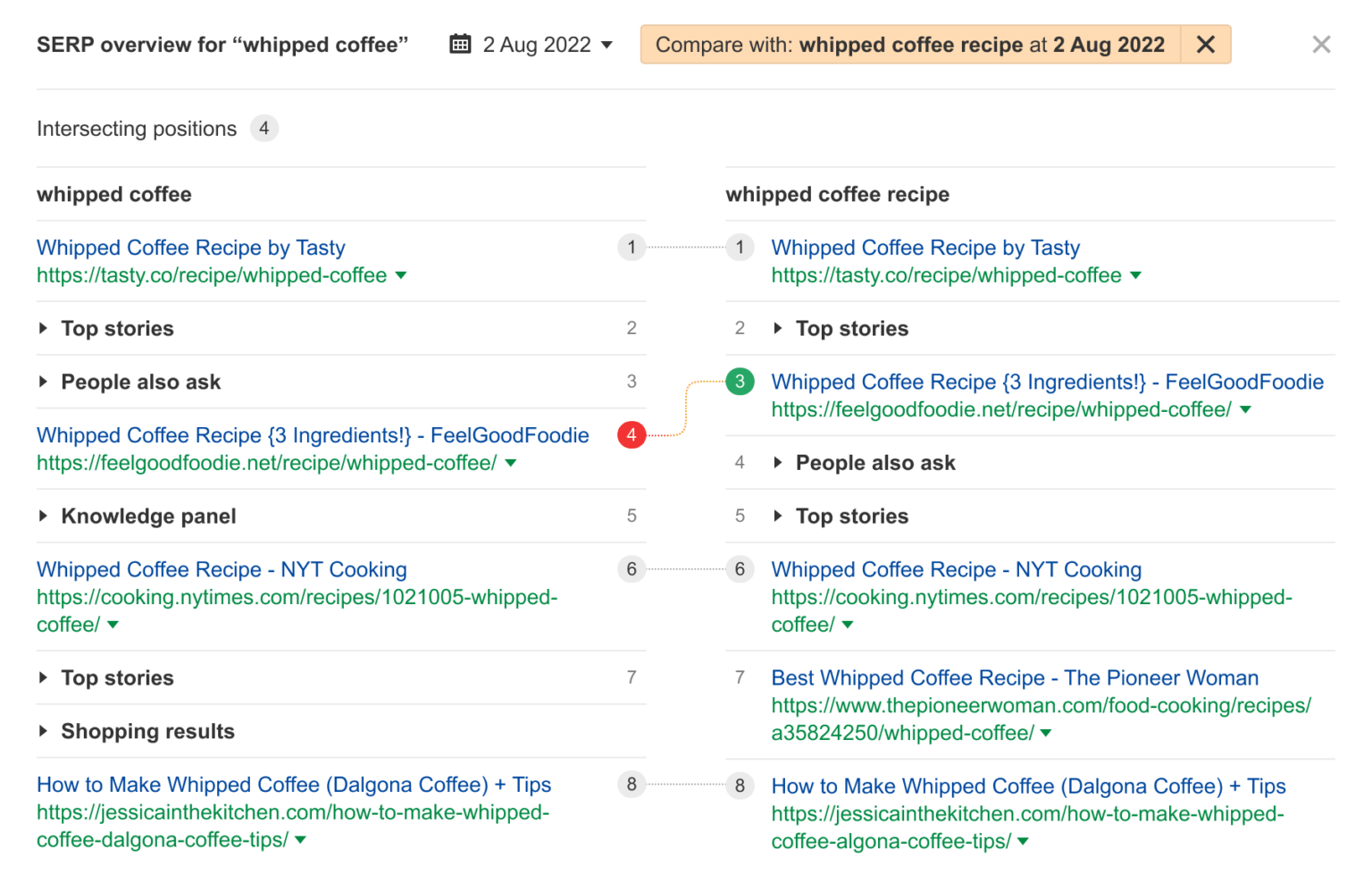
The top ranking pages for both keywords are almost identical. This means that Google considers the search query 'whipped coffee recipe' to be a subtopic of a more general query, 'whipped coffee'. So you can rank for both keywords on a single page.
Now compare the search results for 'whipped coffee' with the search results for 'whipped coffee without sugar':
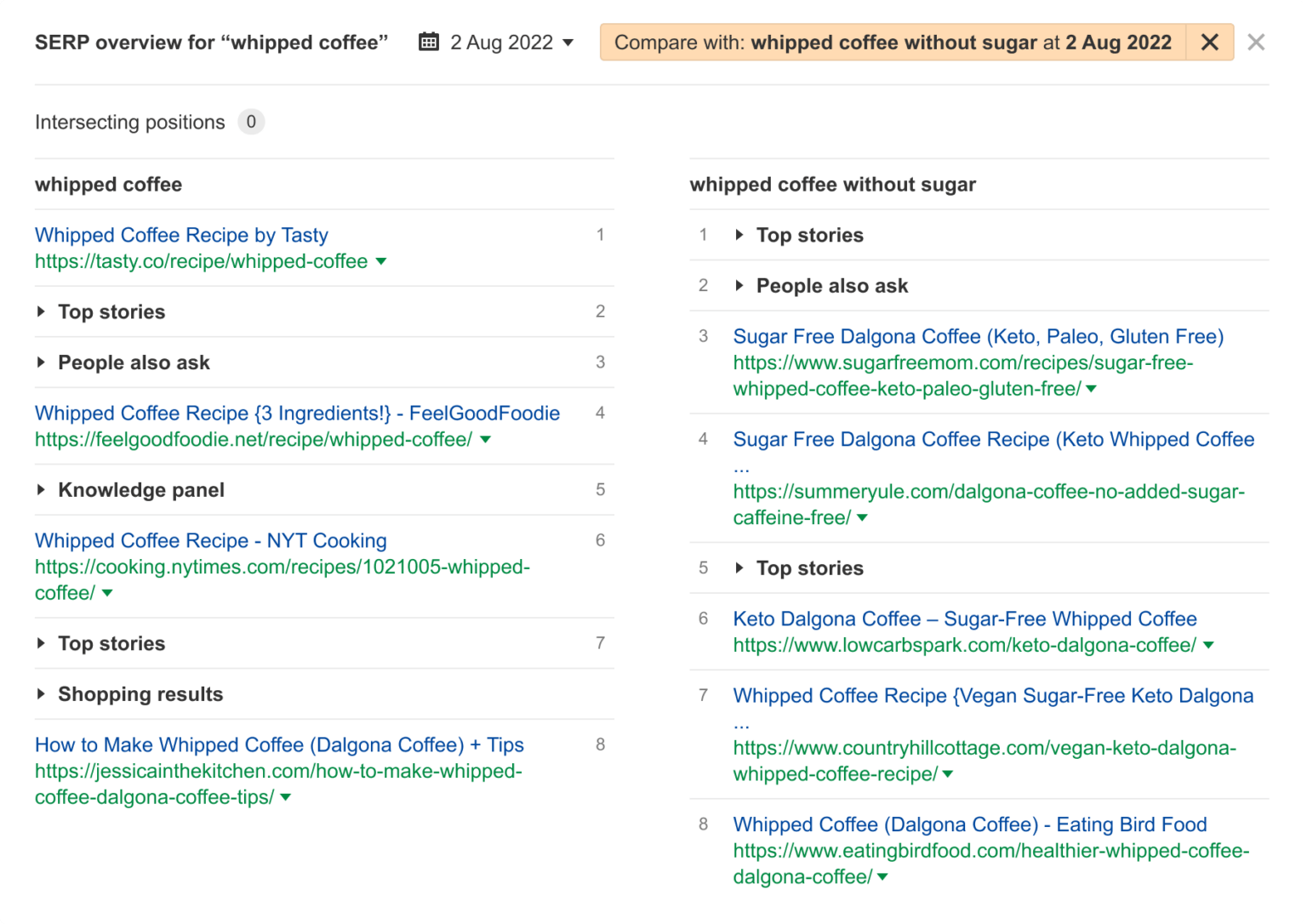
This time, there is absolutely no overlap between the two SERPs. That means 'whipped coffee without sugar' is not part of the broader topic of 'whipped coffee'. Or at least Google doesn't think so. That means you'll need to create two separate pages if you want to target both of these keywords.
Comparing search results for seemingly related keywords is a great way to understand how closely related they are and whether you should target them with one page or multiple pages. But doing this for hundreds of keywords can be quite a daunting task.

But let's take a look at the top ranking pages for the keyword 'what is whipped coffee':
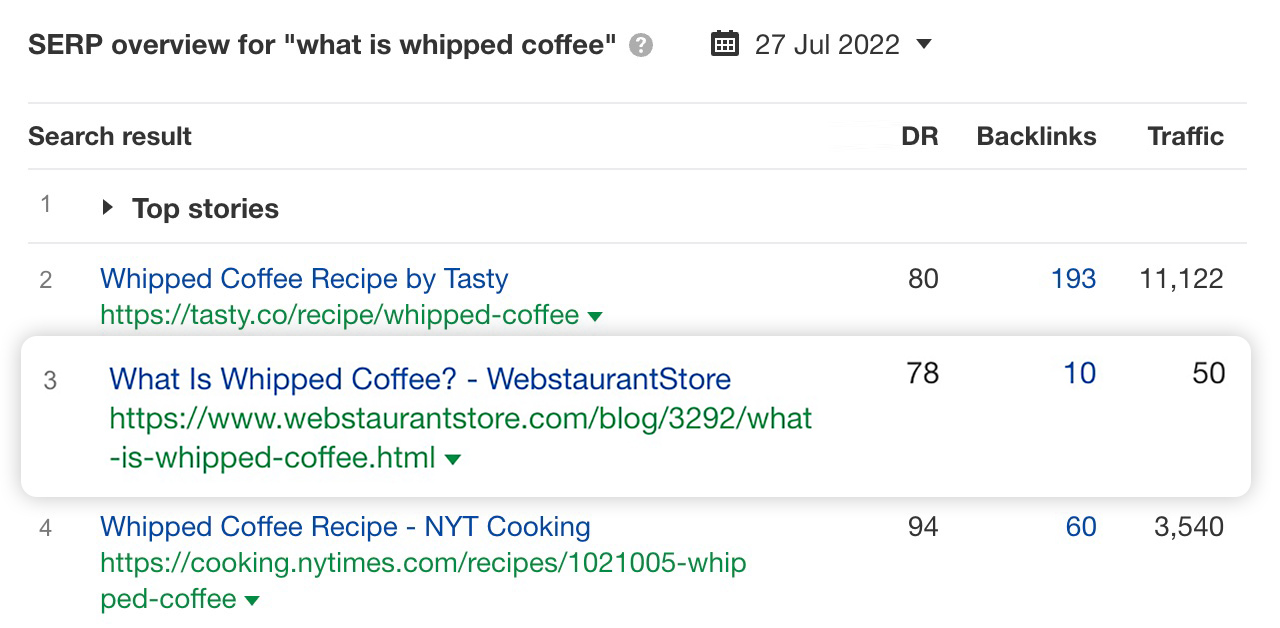
Right at position number 3, we see a page optimized precisely to target the specific search query 'what is whipped coffee'. Although the pages above and below it are actually targeting a more general term: 'whipped coffee recipe'.
So if you feel that a certain sub-topic really deserves its own page, take the risk and go for it! The effort put in can bring a worthy result.
2. Research search intent
Let's say you have the following keywords in your list:
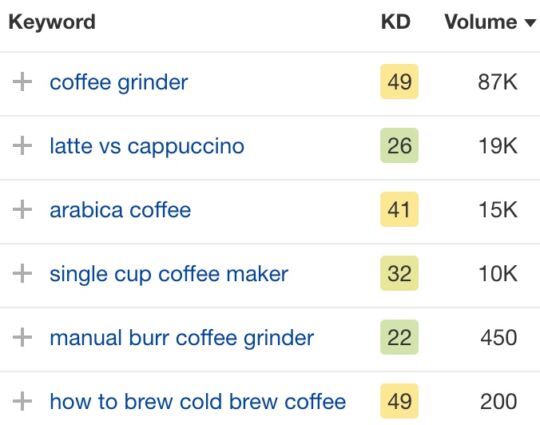
Now you need to understand which ones should be best targeted with informative blog posts and which ones should be product or category pages.
For some keywords, this is obvious. You wouldn't create a product page about 'how to make cold brew coffee' because searchers clearly want a tutorial.
But what about keywords like 'arabica coffee'? Do searchers want information or do they want to buy coffee? In SEO, we call this search intent research.
Presumably Google has some way of determining exactly what searchers want to see for any given search query. And whichever page best serves search intent tends to rise to the top of search results. So the way you determine the search intent behind certain keywords is to look at the top ranking pages.
Let's look at the SERP for 'arabica coffee':
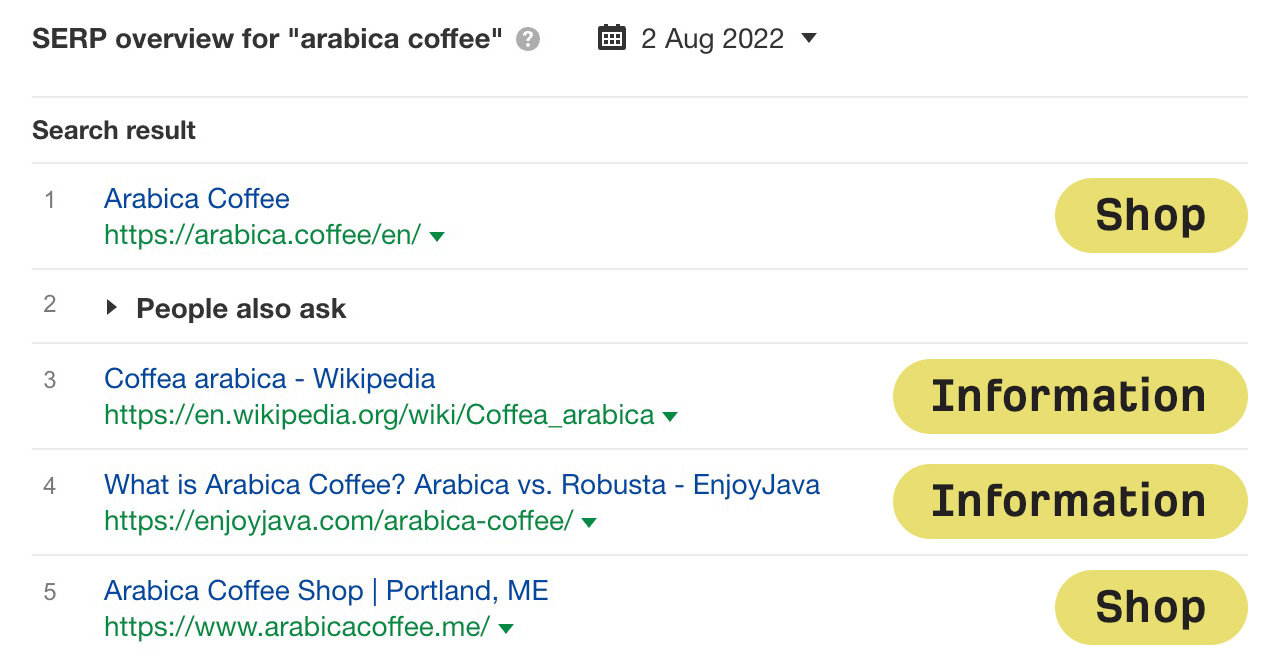
Here we have both: information page and online store. In SEO, we call this broken search intent. That means you can rank for this keyword with any of the two page types.
But determining the right search intent goes beyond identifying the right type of page for a specific query. Ideally, you must take into account the following variables:
- Type – For example: blog posts, product pages, category pages, landing pages, online tools, etc.
- Format – For example: guides, lists, news, reviews, comparisons, etc.
- Perspective – It is your unique perspective on a certain topic.
This is a great example of the standout content angle. In the search results for 'how to make latte', someone focused on making the perfect latte, while another decided to share how to do it without an espresso machine.

But what if you tried the following angle for your own article: 'How to Make a Latte Like Gordon Ramsay'. Maybe some people will find this interesting and click on your page?
As you may know, the reason why you need to analyze the search intent of a keyword is not necessarily mechanical.
If you have a strong opinion about the search intent of a given search query but none of the top ranking pages seem to follow it, give your intuition a chance. Even if your page is different from what's already out there, Google can still give it a chance and show it to some searchers. And if they like it, your site is guaranteed its spot on the SERP.
Part 5: How to prioritize keywords
Prioritizing your keyword list and deciding where you should invest your efforts first is probably the least straightforward and extremely 'individual' part of the keyword research process.
There are so many things to consider:
- What is this keyword's estimated traffic potential?
- What is the difficulty rating? Who are you competing with?
- What does it take to create the perfect page? Or maybe you already have one and it needs improvement?
- What is the business value of this keyword? What will you get in return for ranking for it?
The last point is especially important. While search volume, traffic potential, ranking difficulty, and search intent are all important considerations, you also need to consider what ranking for this keyword will be valuable to your business. your.
How to evaluate the 'business potential' of keywords
Many marketers assess the value of a keyword by relating it to the so-called buyer's journey, which is a process people go through before making a purchase. Conventional wisdom holds that the earlier people join the journey, the less likely they are to make a purchase.
Here's a popular buyer's journey framework:
- Top of the Funnel (TOFU) – People are looking for general information about this topic.
- Middle of the Funnel (MOFU) – People are researching off-the-shelf solutions to their problems.
- Bottom of the Funnel (BOFU) – People are looking to buy a specific product or service.
TOFU keywords tend to have high search volume but low conversion rates (for example 'keyword research', has 5,700 monthly searches). Although BOFU keywords are extremely lucrative, their search volume is much lower (e.g. 'keyword research tool' has 800 monthly searches).
This type of framework is quite limited and can even be confusing.
Here are 3 reasons why:
First, just because someone is searching for a TOFU term like 'keyword research' doesn't mean you can't advertise your product to them.
Second, it is quite difficult to assign each keyword a definitive TOFU, MOFU or BOFU label because things are not always clear. For example, 'best keyword research tool' could be a MOFU or BOFU keyword, depending on how you look at it.
Third, some marketers expand their definition of TOFU so much that they end up covering completely unrelated topics. For example, the folks at HubSpot wrote articles targeting the following keywords: 'famous quotes,' 'ice breaker games' and most hilariously, 'shrug emoji'.
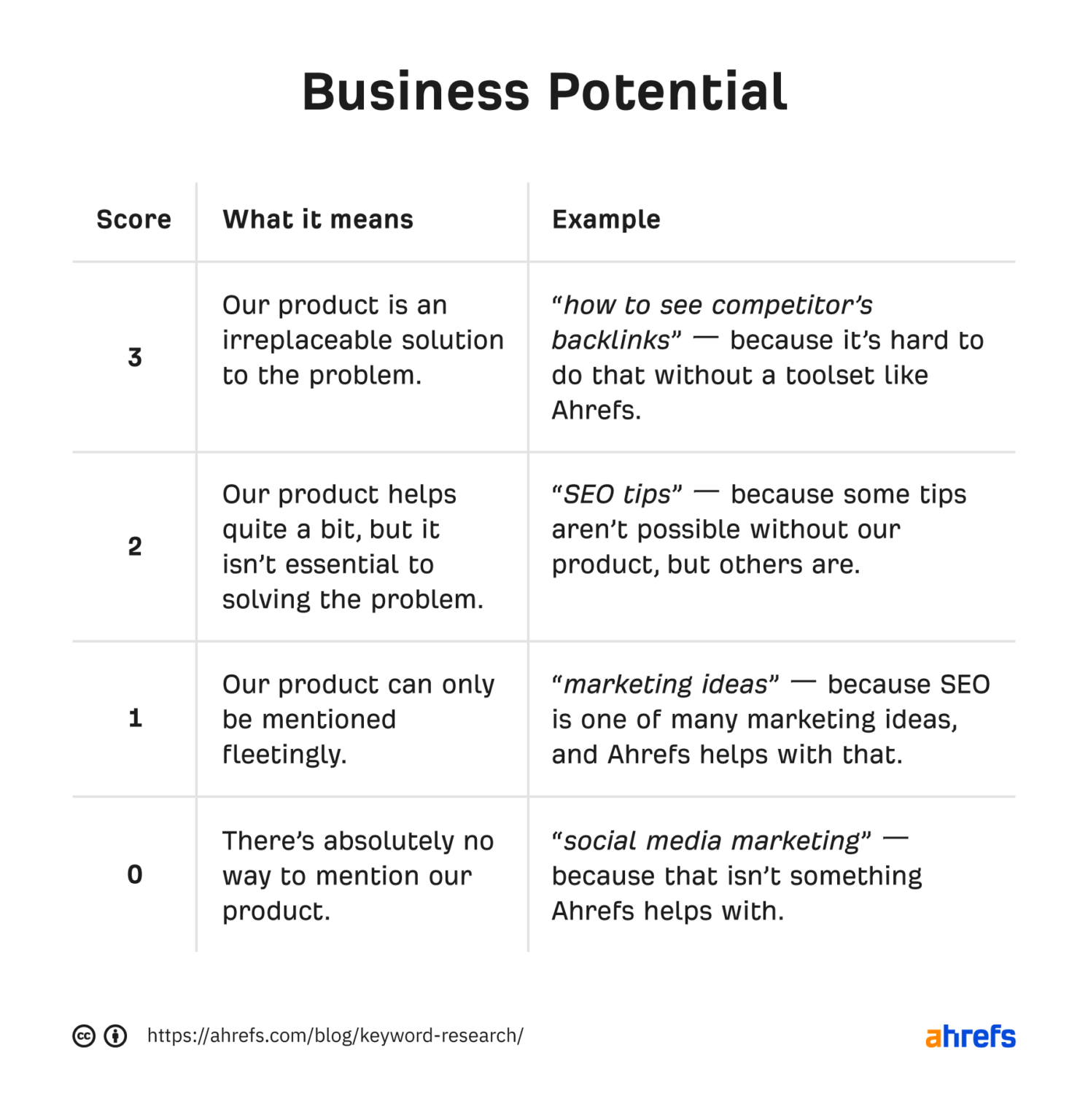
Which keywords should you start working on first?
Unfortunately, there is no clear answer to this question. As SEOs often say: 'It depends'.
- Are you working on a brand new website or an established business?
- Are you the only marketer or do you manage a large team?
- Are you responsible for actual conversions or providing new leads to the sales team?
- How quickly do you need to show results?
Keyword research is an act of balancing your unique circumstances with a set of metrics and concepts that this article just covered: Traffic potential, keyword difficulty, business potential. business and search intent.
In some cases, your job will be to get as much traffic as quickly as possible, which depends on finding high search volume, low difficulty keywords. Other times, you'll need to focus on leads or conversions, in which case business potential will be the most important metric to focus on.
Keyword research is not the process of finding 'easy to rank' keywords. It's the process of finding the keywords that make the most sense for your business.
You should also have short-term, mid-term, and long-term ranking goals. If you only focus on short-term goals, you will never rank for the most profitable keywords. If you only focus on medium and long-term goals, it will take years to get traffic.
Part 6: Keyword research tools
Keyword research is practically impossible without specialized tools. And if you're just starting out or on a tight budget, here are some free keyword research tools for you:
- – It shows all the search queries your website is currently ranking for and receiving clicks from.
- – This is a free plan of Ahrefs, very similar to Google Search Console. But in addition to showing you the keywords your site is ranking for, we also show you their Keyword Difficulty (KD) score.
- – This is a tool for those who want to run ads on Google. But SEOs can also get some value from using it.
- – Free tool to generate keyword ideas.
- – Free tool to check keyword ranking difficulty.
And once you're really serious about increasing your site's search traffic, make sure to sign up for Ahrefs and try out Keywords Explorer. This tool has pretty much everything you need to do expert-level keyword research and discover some lucrative keyword ideas.
Good luck!